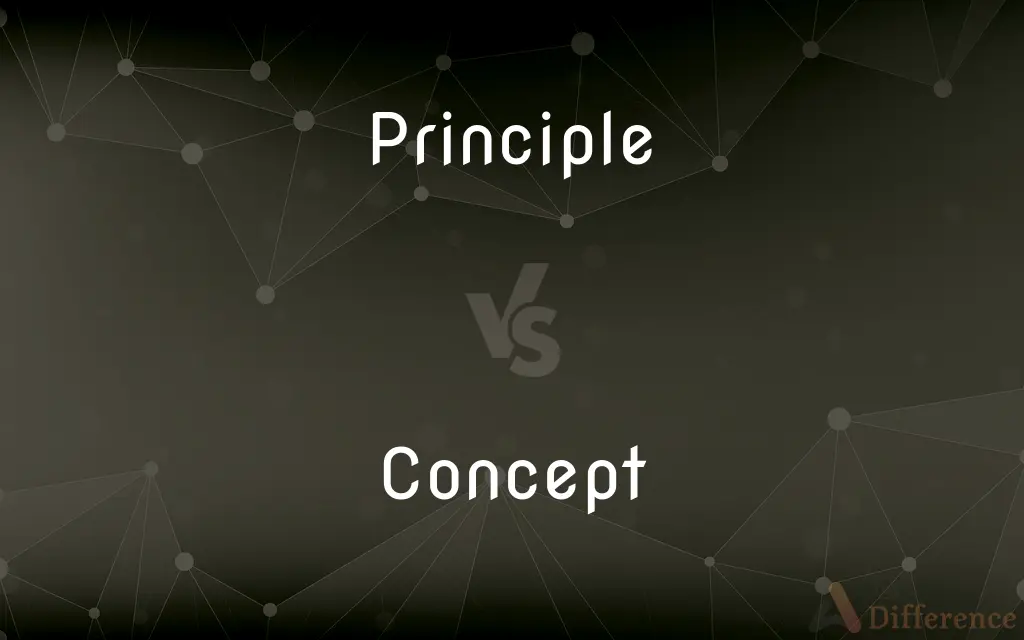Principle vs. Concept — What's the Difference?
Edited by Tayyaba Rehman — By Fiza Rafique — Updated on February 28, 2024
"Principle" refers to a fundamental belief or rule that guides actions, while "concept" is a general idea or understanding about something.

Difference Between Principle and Concept
Table of Contents
ADVERTISEMENT
Key Differences
A principle is a foundational belief or doctrine that influences decisions and actions, often serving as a moral or ethical guideline, e.g., "The principle of fairness is important in justice." Concepts, on the other hand, are abstract ideas or mental representations of phenomena, objects, or relationships, e.g., "The concept of gravity explains why objects fall."
Principle embodies the core values or standards that one adheres to or is expected to follow within a certain context. Concepts provide a framework for understanding and categorizing the world around us, without necessarily imposing a directive on behavior.
Principles are more prescriptive, offering a basis for judgment and behavior, whereas concepts are descriptive, aiming to explain or understand. This distinction highlights their different roles in guiding actions versus enhancing comprehension.
Principles often have a normative or ethical dimension, concepts are neutral and can apply to any area of knowledge, from science to art. This difference underscores the practical application of principles versus the theoretical nature of concepts.
Despite these differences, both principles and concepts are integral to the way individuals think about and interact with the world. Principles provide a moral compass, and concepts offer cognitive maps for navigating complex information and phenomena.
ADVERTISEMENT
Comparison Chart
Definition
A fundamental truth or proposition serving as the foundation for belief or action
An abstract idea representing the fundamental characteristics of something
Nature
Normative (guiding actions and judgments)
Descriptive (explaining or understanding phenomena)
Application
Ethical, moral, or procedural guidance
Theoretical understanding or categorization
Examples
"Honesty is the best policy" (ethical principle)
"The concept of evolution" (scientific understanding)
Function
Serves as a guideline for behavior or beliefs
Provides a framework for thinking about and discussing ideas
Compare with Definitions
Principle
Fundamental belief guiding actions.
The principle of equality underpins democratic societies.
Concept
General idea or understanding.
The concept of time travel fascinates many.
Principle
Foundational doctrine.
The organization operates on the principle of mutual respect.
Concept
Abstract thought or notion.
Her artwork explores the concept of identity.
Principle
Core value or standard.
Following the principle of transparency, the company shares its policies openly.
Concept
Theoretical construct.
Economists debate the concept of rational choice.
Principle
Rule forming the basis of a system.
The principles of physics explain natural phenomena.
Concept
Mental representation.
Children develop the concept of gravity through observation.
Principle
Ethical guideline.
He refused to lie, sticking to his principles.
Concept
Framework for categorizing information.
The concept of species aids in biological classification.
Principle
A principle is a proposition or value that is a guide for behavior or evaluation. In law, it is a rule that has to be or usually is to be followed.
Concept
Concepts are defined as abstract ideas or general notions that occur in the mind, in speech, or in thought. They are understood to be the fundamental building blocks of thoughts and beliefs.
Principle
A fundamental source or basis of something
The first principle of all things was water
Concept
A general idea or understanding of something
The concept of inertia.
The concept of free will.
Principle
A fundamental truth or proposition that serves as the foundation for a system of belief or behaviour or for a chain of reasoning
The basic principles of justice
Concept
A plan or original idea
The original concept was for a building with 12 floors.
Principle
A rule or standard, especially of good behavior
A man of principle.
Concept
A unifying idea or theme, especially for a product or service
A new restaurant concept.
Principle
The collectivity of moral or ethical standards or judgments
A decision based on principle rather than expediency.
Concept
An abstract and general idea; an abstraction.
Principle
A rule used to choose among solutions to a problem.
The principle of least privilege holds that a process should only receive the permissions it needs.
Concept
An abstract or general idea inferred or derived from specific instances
Principle
A fundamental truth; a comprehensive law or doctrine, from which others are derived, or on which others are founded; a general truth; an elementary proposition; a maxim; an axiom; a postulate.
Therefore, leaving the principles of the doctrine of Christ, let us go on unto perfection.
A good principle, not rightly understood, may prove as hurtful as a bad.
Principle
Rule of personal conduct
Common Curiosities
What is the main difference between a principle and a concept?
A principle is a foundational belief guiding actions, while a concept is a general idea or understanding.
Can a concept be a principle?
While related, concepts are the understanding of phenomena, and principles are the beliefs or rules derived from such understandings.
Are principles always moral or ethical?
Mostly, but they can also be procedural or foundational beliefs in various systems, not just ethical ones.
How are principles applied in everyday life?
Principles guide decisions and behaviors according to moral, ethical, or procedural standards.
How do concepts influence knowledge?
Concepts help structure and categorize knowledge, facilitating understanding and communication about the world.
Is a principle always based on a concept?
Not always, but principles can be informed by concepts or empirical understanding.
How are concepts developed?
Concepts are developed through observation, learning, and abstract thinking to represent ideas or phenomena.
Can principles and concepts overlap?
Yes, principles can be based on concepts, and understanding concepts can be guided by principles, but their fundamental natures are different.
Why are principles important in professional fields?
Principles provide a foundation for professional conduct, ensuring actions align with ethical standards and best practices.
Can principles change over time?
Yes, principles can evolve with societal values and knowledge.
Do principles differ across cultures?
Yes, principles can vary significantly across different cultural or societal contexts based on differing values and beliefs.
Can there be wrong concepts?
Concepts themselves are neutral; however, misconceptions can arise from incorrect or incomplete understanding.
How do principles affect decision-making?
Principles serve as a guide or framework for making choices, often reflecting ethical or moral standards.
Are concepts universal?
While some concepts are widely recognized, the understanding and interpretation of concepts can vary across different cultures and disciplines.
How do new concepts emerge?
New concepts often emerge from the advancement of knowledge, innovative thinking, or the need to explain newly observed phenomena.
Share Your Discovery

Previous Comparison
Ferry vs. Cruise
Next Comparison
The vs. ThisAuthor Spotlight
Written by
Fiza RafiqueFiza Rafique is a skilled content writer at AskDifference.com, where she meticulously refines and enhances written pieces. Drawing from her vast editorial expertise, Fiza ensures clarity, accuracy, and precision in every article. Passionate about language, she continually seeks to elevate the quality of content for readers worldwide.
Edited by
Tayyaba RehmanTayyaba Rehman is a distinguished writer, currently serving as a primary contributor to askdifference.com. As a researcher in semantics and etymology, Tayyaba's passion for the complexity of languages and their distinctions has found a perfect home on the platform. Tayyaba delves into the intricacies of language, distinguishing between commonly confused words and phrases, thereby providing clarity for readers worldwide.
















































